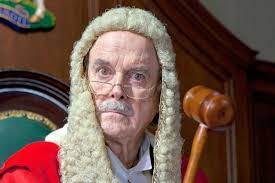In this segment, Mr. Jones takes up the declarations by fear mongers that absent their usually expensive and often unnecessary services, someone else, usually the court, will decide who gets your property when you die.
“Don’t Let the Courts Decide Who Will Receive Your Property”
Over the years, I have occasionally noticed an advertisement in the local newspapers inviting people to a “A Free Seminar” on the advantages of a Living Trust as a means for Avoiding Probate. The advertisement preys upon the fears of most lay people of the myth that probate is always a lengthy and expensive process which is to be avoided at all costs.

The ad features a picture of a Judge-like figure (i.e. older gentleman in a black robe and wielding a gavel) who announces: Don’t Let The Court Decide Who Will Receive Your Property When You’re Gone. The ad is intended to frighten people into showing up for “A Free Seminar” where they will be lectured for three hours about the advantages of Living Trusts as a probate avoidance device. They would then be coerced into agreeing to pony up $2,500 to the purveyors of this product for a one size fits all Living Trust kit, in a faux leather bound notebook with their names embossed on it in gold colored paint.
The hawkers of these Living Trust kits exploit peoples fears about the probate process as a way to sell their merchandise. The fear is based on a myth that somehow through the mysterious process of probate, the Courts will make the decisions about who will become the beneficiaries of a persons estate. These customers are sold a Living Trust package that they likely don’t need, and in most case won’t even use for the administration of their estate, to avoid this from happening to their family and loved ones.
 The fact is that the Court has no part in deciding who the beneficiaries and devisees of a person’s estate will be. If a person has made a valid Last Will and Testament, then that document will be the sole means for determining the beneficiaries of that persons estate. If the deceased fails to make a Will, (and has made no other quasi-testamentary provisions for the transfer of their assets on death such as a community property agreement or a joint tenancy with right of survivorship account), then the laws of intestate succession (primarily RCW 11.04.015) will determine who the heirs of the Estate will be. This is a determination made by the legislature – NOT THE COURTS – that in the absence of a valid Will, an intestate estate will pass to the decedent=s nearest living relatives by order of nearest consanguinity.
The fact is that the Court has no part in deciding who the beneficiaries and devisees of a person’s estate will be. If a person has made a valid Last Will and Testament, then that document will be the sole means for determining the beneficiaries of that persons estate. If the deceased fails to make a Will, (and has made no other quasi-testamentary provisions for the transfer of their assets on death such as a community property agreement or a joint tenancy with right of survivorship account), then the laws of intestate succession (primarily RCW 11.04.015) will determine who the heirs of the Estate will be. This is a determination made by the legislature – NOT THE COURTS – that in the absence of a valid Will, an intestate estate will pass to the decedent=s nearest living relatives by order of nearest consanguinity.

The Court, through the probate process, has a very small role in such decisions. Except to the extent there is some ambiguity in the Will or some controversy in determining who an intestate persons nearest relatives might be the probate process only dictates the mechanics of making sure that the decedent’s valid debts are paid first, and then that there is an orderly process for marshaling of assets and the transition of a persons wealth and property to his named beneficiaries or intestate heirs.
Its a travesty that hundreds of thousands of people have been sold one of these Living Trust packages over the years bas
ed on this myth that the Court will some how play a significant role in deciding who the beneficiaries of a persons estate will be.
Next Segment: If you have no spouse or children and you die without a Will, your estate will go to the government.
